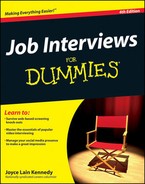Chapter 11
Looking Good with Questions You Ask
In This Chapter
![]() Asking work questions before the offer
Asking work questions before the offer
![]() Asking personal questions after the offer
Asking personal questions after the offer
![]() Drawing out hidden objections
Drawing out hidden objections
![]() Treading lightly around delicate questions
Treading lightly around delicate questions
![]() Finishing with the right question
Finishing with the right question
So you just finished answering a seemingly endless line of questions about your work history and your education, and you’re pretty confident that you held your own. Now the interviewer turns to you and asks, “Do you have any questions?” This question is your cue to ask how much money you’re gonna make at this outfit anyway, right? Wrong!
The types of questions you ask and when you ask them are the least understood parts of the interview. Your questions offer major chances for garnering curtain calls or being booed off the stage. Sort your question opportunities into two categories:
![]() Questions that sell you: These questions help you get an offer; they’re a way to sell without selling.
Questions that sell you: These questions help you get an offer; they’re a way to sell without selling.
![]() Questions that address your personal agenda: These questions about pay, benefits, and other self-interest items need to be asked only after you receive an offer — or at least a heavy hint of an offer.
Questions that address your personal agenda: These questions about pay, benefits, and other self-interest items need to be asked only after you receive an offer — or at least a heavy hint of an offer.
Asking Selling Questions before the Offer
For all jobs, asking about anything other than work issues before a hiring offer comes your way is a serious strategic error. The interviewer, particularly a hiring manager who resents the time “diverted” from typical duties to an interview, is totally uninterested in your needs at this point.
To talk about your needs before an offer turns the interviewer’s mind to negative thoughts: All you want is money, insurance, and a nice vacation on the company. You’re not interested in doing the job.
As an Applause candidate, you’re not going to make that mistake. Keep your focus on the employer’s needs and how you can meet them. Sell yourself by asking questions that are
![]() Work focused
Work focused
![]() Task focused
Task focused
![]() Function focused
Function focused
![]() What would be my first project if I were hired for this position?
What would be my first project if I were hired for this position?
![]() What would my key responsibilities be?
What would my key responsibilities be?
![]() Who (and how many) would I supervise? To whom would I report?
Who (and how many) would I supervise? To whom would I report?
![]() Would I be working as a member of a team?
Would I be working as a member of a team?
![]() What percentage of time would I spend communicating with customers, coworkers, and managers?
What percentage of time would I spend communicating with customers, coworkers, and managers?
![]() Would on-the-job training be required for a new product?
Would on-the-job training be required for a new product?
![]() Can you describe a typical day?
Can you describe a typical day?
![]() If I produced double my quota, would you double my base pay?
If I produced double my quota, would you double my base pay?
![]() Was the last person in this job promoted? What’s the potential for promotion?
Was the last person in this job promoted? What’s the potential for promotion?
![]() How would you describe the atmosphere here? Formal and traditional? Energetically informal?
How would you describe the atmosphere here? Formal and traditional? Energetically informal?
![]() Where is the company headed? Merger? Growth?
Where is the company headed? Merger? Growth?
![]() What type of training would I receive?
What type of training would I receive?
![]() What resources would I have to do the job?
What resources would I have to do the job?
![]() How much would I travel, if any?
How much would I travel, if any?
![]() (If a contract job) Do you anticipate extensive overtime to finish the project on schedule?
(If a contract job) Do you anticipate extensive overtime to finish the project on schedule?
![]() Where does this position fit into the company’s organizational structure?
Where does this position fit into the company’s organizational structure?
![]() What results would you expect from my efforts and on what timetable? What improvements need to be made on how the job has been done until now?
What results would you expect from my efforts and on what timetable? What improvements need to be made on how the job has been done until now?
How much time should you invest in asking selling questions? Five to ten minutes is not too much. Gregory J. Walling, a top executive recruiter based in Alexandria, Virginia, says he’s never heard an employer complain about a candidate being too interested in work.
Asking Self-Interest Questions after the Offer
When you have the offer, you’re ready to make the switch from giving to receiving information. I discuss negotiating salary and benefits in Chapter 8, but you’ll also want to know about information like leave time, overtime, flextime, frequency of performance reviews, and (if it’s a contract job) how long the job will last.
Although asking personal agenda questions in advance of an offer is unwise, after the offer, scoop up details of interest, such as these examples:
![]() Is my future relocation a possibility?
Is my future relocation a possibility?
![]() Is my employee parking included in the offer?
Is my employee parking included in the offer?
![]() Does management delegate decision making to others, or does it micromanage and require that I get approval of even the tiniest details?
Does management delegate decision making to others, or does it micromanage and require that I get approval of even the tiniest details?
![]() Where would I work in the building? Can I take a quick look at the location?
Where would I work in the building? Can I take a quick look at the location?
![]() Is the schedule fixed (such as 9 a.m. to 5 p.m.) or flexible (my choice of hours)?
Is the schedule fixed (such as 9 a.m. to 5 p.m.) or flexible (my choice of hours)?
![]() Would I have an exempt (from overtime pay) or nonexempt position?
Would I have an exempt (from overtime pay) or nonexempt position?

Drawing Out Hidden Objections
The questions you ask have one more mission: They’re a good way to smoke out hidden concerns or objections that may keep you from finishing first in the competition.
Reasons that employers hang back with unspoken anxieties often relate to legal vulnerability (see Chapter 22 on inappropriate questions), or the interviewer may simply be uncomfortable asking about them.
Whatever the reason, silent concerns are hurdles standing in the way of your getting the job. Before the interview is over, you need to find a way to address any thorny issues and overcome them.
Good salespeople call techniques that do this “drawing out objections.” Once you know the issues that — under the surface — are chilling your chances, try calling them out.
One of the best questions I’ve ever heard to jar loose unspoken doubts was passed on by legendry recruiting authority and author John Lucht (www.ritesite.com). When the interview is about four-fifths complete, Lucht suggests you ask this question:
What do you think would be the biggest challenge for someone with my background coming into this position?
Here’s your golden opportunity to bury any concerns on the spot or in your thank-you letter. (If you can’t collect your thoughts quickly enough, at least you’ll have a clue for your next interview once you know what may be holding back employers from choosing you.)
Another tactic to control a problem lurking below the surface is to introduce it head-on and tell the employer what you want known about the situation. Here’s an example of easing an interviewer’s hidden concerns by bringing up a legally risky topic:
In your place, I’d probably be wondering how my children are cared for during the day. I may be concerned that I’d miss work should they become ill. Let me explain my very reliable childcare arrangements to you. . . .
After hidden objections see daylight, you have a chance to shoo away elephants in the room that are standing between you and a job offer.
Asking Certain Questions Very Carefully
Handle questions to potential employers about their own performance with great tact — especially when a Millennium-generation candidate asks them of a Boomer-generation boss. Proceed with caution into territory like the following:
![]() How would you describe your management style?
How would you describe your management style?
![]() Do your employees admire you as a boss?
Do your employees admire you as a boss?
Although you need as much information as possible to make good job choices, asking a potential boss these kinds of questions in the wrong tone of voice may make you seem way too audacious. Moreover, direct questions about personal characteristics and values tend to elicit pure topspin.

Instead, ask questions designed to draw out companywide anecdotal answers:
![]() How did the company handle a recent downsizing?
How did the company handle a recent downsizing?
![]() How did managers react to someone who took a stand on principle?
How did managers react to someone who took a stand on principle?
![]() Who are the company’s heroes?
Who are the company’s heroes?
This approach encourages conversation that can be very informative. Questions are tools. Use them wisely
Ending Suspense by Asking the Right Question
Page ahead to Chapter 12, and you see a lineup of fundamental questions to ask at the end of each interview. Want another option for immediate feedback? When your meeting has sailed smoothly along and you want to know your odds right now but you don’t want to appear overconfident or too anxious, ask the right question:
Should I assume you’d like me to continue in the interviewing process?
[yes] What would the next step be?
[no] I’m sorry to hear that. Can you tell me why I won’t be in the running? (If you can overcome the objections, give it a try; if not, thank the interviewer for the time spent with you and move on.)
When you don’t hear the yes word, at least you won’t be holding your breath to know whether this particular work opportunity is a lost cause. If the no word sparks a serious state of doldrums, break out an effective mood elevator — hot fudge sundae? funny movie? upbeat music?

